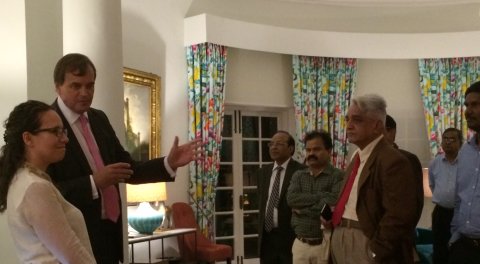Meeting Members and forging partnerships in India

Earlier this month we went to India to launch our new five-year strategy and explore ways in which RSTMH can provide more value to its Members from India. We currently only have around 30 Members from India, although over 200 Indian researchers and professionals contribute to our scientific journals.
The official launch of our strategy took place at the Residence of the British High Commissioner, Sir Dominic Asquith, who commended our new strategy. Around 40 Members, authors and reviewers from in and around Delhi joined the evening reception, to hear in detail about the new strategy and to discuss its implications for India. We discussed the need for RSTMH to make Members aware of our small grants and travel scholarships, which are much needed by early career researchers and professionals. As is the case in many other countries, small grants at this low level, aimed at seed funding and proof of concept work, are rare but very useful for early or innovative ideas to have a chance to be tested, before larger grants can be applied for.
There was also a discussion about how the thematic priorities described in the strategy are relevant to the current health problems in India. Examples of relevant areas include resistance to antibiotics, drug-resistant TB and malaria and how certain communities are affected by increasing urbanisation and climate change.
A wealth of global health research
The overarching message from the event attendees is there is an abundance of research happening across India and it’s important for it to be showcased alongside research on similar diseases and health challenges, from other countries in the RSTMH journals and meetings, so patterns can be seen, learnings shared and impact achieved.
The week also included a trip to C-Camp in Bangalore, the Centre for Cellular and Molecular Platforms, where high-end technology in life sciences are developed. Here we talked about how RSTMH can help showcase existing and potential technologies that would help diagnosis and safeguard medicines, such as antibiotics and antivirals. Encouraging Members to find out more about careers in this area, alongside the enormous range of skills needed to tackle tropical diseases and other health issues, would be welcome and possible, given the range of contacts and partners in India.
We also discussed the potential role of organisations such as RSTMH in bringing together and stimulating discussion between the private sector, clinicians, academics, social scientists and policymakers. These cross-sector and cross-discipline meetings, which have taken place in areas such as AMR in recent years could be used for lesser-known health challenges.
Expertise and experience in tropical diseases
In terms of neglected tropical diseases, India has both great experience and expertise. We talked at length about the current situations regarding leprosy, dengue fever, leishmaniasis and chikungunya. It is therefore important that RSTMH does what it can, through its network of Members, to ensure data and learnings are showcased and shared, for the benefit of greater outcomes and impact.
Many Members agreed with the strategic priority to invest more time and energy in early career Members. Though there are mentorship opportunities for early career researchers across India, it was felt there could be more of these, especially for professionals who are on less traditional routes to achieve change in health, such as those in mathematical modelling, health economics and the social sciences.
During the week, we also met representatives from the Wellcome Trust/DBT India Alliance, MSF, Bill & Melinda Gates Foundation, the Department for Biotechnology and the National Institute of Health and Family Welfare. There was consensus that our small grants and travel scholarships would be very welcome for researchers and research in India, in the areas of pure scientific development, implementation, improving health systems and in data gathering and policy development.
Another area of discussion during the visit, which is an important element of our new strategy was how our Members in India, and other countries, could better input into our strategic decision making, through the governance structure. In past decades of RSTMH’s history there were local secretaries in a number of countries, including India. Their role included spreading awareness of our work and activities like the small grants programme and medals awards. Ideas for how to achieve this ranged from establishing informal connections with a range of institutions from different states, to employing someone in India to dedicate a certain amount of time to this.
Research in Progress
The second area of consensus was around an interest in our annual Research in Progress event, which we carried out in Tanzania in September. This meeting, which has been held in London annually, is focused on creating a platform for individuals in early stages of research, that’s unpublished, to present it through a poster or short presentation. For many, this event offers the opportunity for capacity building and is the first time they have presented research. For others, this is a chance to test out new theories or hypotheses.
In the last two events we have also included a mentorship element, enabling attendees to have some time with senior professionals to talk about their career focus and development, as well as how to get funded or published. There was real support for us to test out this event in India, potentially trying it out in a few different states.
The trip to India brought up many new potential opportunities and we look forward to exploring these in the months to come.